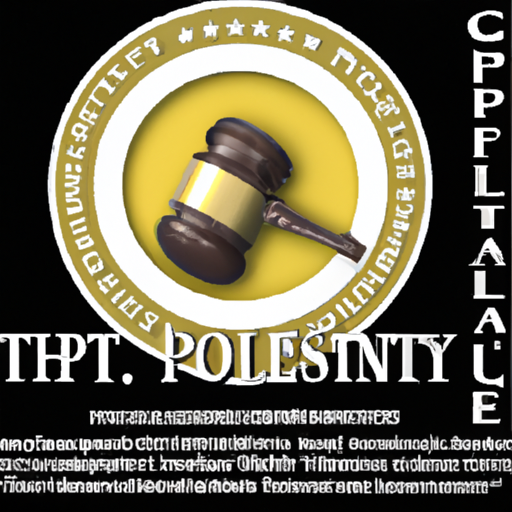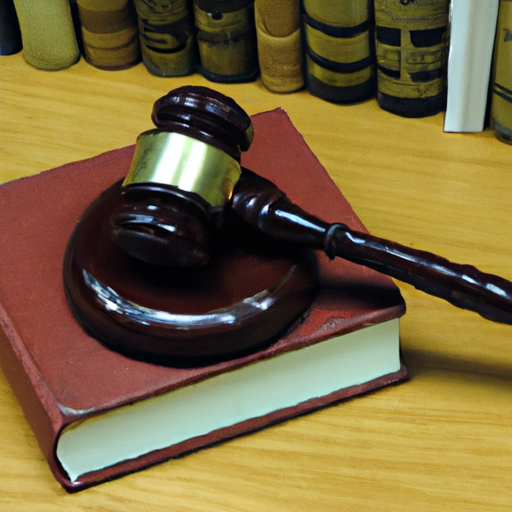When it comes to protecting your intellectual property, it’s crucial to have a skilled and experienced lawyer by your side. In Layton, Utah, there is a lawyer who specializes in intellectual property law and is dedicated to helping businesses safeguard their valuable inventions and creative works. With a deep understanding of the complexities of intellectual property rights, this lawyer is well-equipped to assist companies and business owners in navigating the legal landscape. Through their expertise, they can provide guidance on trademarks, copyrights, patents, and trade secrets, ensuring that your intellectual property is fully protected. To learn more about how this lawyer can assist you with your intellectual property needs, contact them today for a consultation.
Overview of Intellectual Property
Intellectual Property (IP) refers to creations of the mind, such as inventions, literary or artistic works, symbols, names, images, and designs used in commerce. These intangible assets often hold significant value for businesses and creators and should be protected from unauthorized use or infringement.
What is Intellectual Property?
Intellectual Property encompasses a range of legal rights that are granted to individuals or organizations to protect their intangible creations. These rights provide the owner with exclusive control over the use and exploitation of their creations for a limited period. Examples of Intellectual Property include patents, trademarks, copyrights, and trade secrets.
Types of Intellectual Property
-
Patents: Patents grant inventors exclusive rights to their inventions, preventing others from making, using, or selling the patented invention without permission.
-
Trademarks: Trademarks are distinctive signs, symbols, or words used to identify and differentiate goods or services of one business from those of others. They help consumers recognize and associate a particular brand or product with its source.
-
Copyrights: Copyright protects original works of authorship, such as art, literature, music, and software. It grants the author or creator exclusive rights to reproduce, distribute, display, and perform their work.
-
Trade Secrets: Trade secrets encompass confidential and valuable information, such as formulas, processes, customer lists, and business strategies. Unlike patents or copyrights, trade secrets are protected through secrecy and not by registration.
Why is Intellectual Property Important?
Intellectual Property is essential for businesses and individuals for several reasons:
-
Incentive for Innovation: Intellectual Property rights promote innovation and creativity by providing legal protection and rewards for those who invest time, effort, and resources into developing new ideas and solutions.
-
Commercial Value: Intellectual Property assets can be valuable assets for businesses, contributing to their market position, brand recognition, and overall competitive advantage.
-
Market Exclusivity: Intellectual Property rights allow owners to prevent others from using or exploiting their creations without permission, giving them a monopoly over their IP and the ability to control its use and commercialization.
-
Legal Protection: Intellectual Property laws enable owners to take legal action against those who infringe on their rights, providing a means of recourse and compensation for the unauthorized use of their creations.
Intellectual Property Laws in Utah
Utah, like other states, has its own Intellectual Property laws that complement federal laws. These laws govern the creation, protection, and enforcement of Intellectual Property rights within the state. It is important for individuals and businesses in Utah to understand both federal and state-level IP laws to effectively protect their intellectual creations.
Services Offered by an Intellectual Property Lawyer
Navigating the complexities of Intellectual Property law can be challenging. That is why hiring an experienced Intellectual Property lawyer is crucial for individuals and businesses seeking to protect their creations and enforce their rights. Here are some key services offered by Intellectual Property lawyers:
Trademarks
Intellectual Property lawyers can assist in the registration and protection of trademarks. They help clients conduct thorough searches to ensure the chosen mark is not already in use, prepare and file trademark applications with the United States Patent and Trademark Office (USPTO), and handle any disputes or enforcement issues that may arise.
Copyrights
Copyright lawyers specialize in the protection of original works of authorship, guiding clients through the copyright registration process, drafting and negotiating licensing agreements, and representing clients in copyright infringement cases.
Patents
Patent lawyers assist inventors and businesses in securing patent protection for their inventions. They conduct prior art searches, prepare and file patent applications, prosecute patent applications before the USPTO, and handle patent infringement litigation.
Trade Secrets
Trade secret lawyers provide counsel on protecting and managing valuable confidential business information. They assist clients in the development and implementation of trade secret protection strategies, draft non-disclosure agreements (NDAs), and pursue legal action against those who misappropriate trade secrets.
Licensing and Contracts
Intellectual Property lawyers can help negotiate and draft licensing agreements, assignments, distribution agreements, and other contracts related to Intellectual Property. They ensure that these contracts adequately protect the client’s IP and outline the rights and obligations of all parties involved.

Benefits of Hiring an Intellectual Property Lawyer
Hiring an Intellectual Property lawyer offers several advantages for individuals and businesses seeking to protect and enforce their Intellectual Property rights:
Expertise and Experience
Intellectual Property lawyers specialize in this complex area of law and have extensive knowledge and experience in handling various IP-related matters. They are well-versed in the legal requirements for the registration and protection of Intellectual Property and can guide clients through the process.
Protection of Intellectual Property Rights
Intellectual Property lawyers work diligently to protect their clients’ IP rights. They conduct comprehensive searches to ensure the uniqueness of trademarks, copyrights, or patents before filing applications. If infringements occur, they take swift action to enforce these rights and seek appropriate remedies.
Navigating Complex Legal Processes
Intellectual Property law involves intricate legal procedures and timelines. Lawyers who specialize in IP law possess in-depth understanding of these processes and can navigate them efficiently on behalf of their clients. They ensure their clients meet all necessary deadlines and requirements for protection and enforcement.
Enforcement and Litigation
In cases of Intellectual Property infringement, an experienced lawyer can assess the situation, build a strong case, and represent the client’s interests in court. They have the knowledge and skills to pursue legal action and seek damages, injunctions, or other appropriate remedies.
Strategic Advice and Counseling
Intellectual Property lawyers provide comprehensive advice and counseling to clients. They offer guidance on the selection and registration of trademarks, the licensing of Intellectual Property, and strategies for protecting trade secrets. They help clients make informed decisions that align with their business goals and legal requirements.
How to Choose the Right Intellectual Property Lawyer
Selecting the right Intellectual Property lawyer is crucial to ensure the effective protection and enforcement of your Intellectual Property rights. Here are some key factors to consider when choosing an IP lawyer:
Specialization and Experience
Look for a lawyer who specializes in Intellectual Property law and has a track record of handling cases and clients similar to yours. Consider their experience in the industry and their knowledge of specific IP issues relevant to your situation.
Reputation and Track Record
Research the lawyer’s reputation within the legal community. Seek out reviews, testimonials, and references from previous clients. A lawyer with a proven track record of success and client satisfaction is more likely to deliver favorable outcomes.
Communication and Availability
Effective communication is essential when working with an Intellectual Property lawyer. Choose a lawyer who is responsive, attentive, and clear in their communication. They should be accessible to address any questions or concerns you may have throughout the process.
Fees and Billing Structure
Discuss the lawyer’s fee structure and ensure that it aligns with your budget and expectations. Some lawyers may charge an hourly rate, while others may offer flat fees for specific services. Clarify any additional costs or expenses that may be incurred during the legal process.
Client Reviews and Testimonials
Reading reviews and testimonials from previous clients can provide valuable insights into a lawyer’s performance and client satisfaction. Look for positive feedback regarding the lawyer’s knowledge, professionalism, and ability to achieve favorable outcomes.

Understanding Intellectual Property Infringement
Intellectual Property infringement occurs when someone violates the exclusive rights of an IP owner without permission. It refers to the unauthorized use, reproduction, distribution, or exploitation of protected IP assets. Understanding the basics of IP infringement is crucial for IP owners to protect their rights effectively.
What is Intellectual Property Infringement?
Intellectual Property infringement involves the unauthorized use or exploitation of someone else’s patented invention, trademarked brand, copyrighted work, or trade secret. This can include copying, reproducing, distributing, or using protected IP assets without permission.
Types of Intellectual Property Infringement
-
Trademark Infringement: Trademark infringement occurs when someone uses a trademark, symbol, or logo that is confusingly similar to an existing registered trademark. This can lead to consumer confusion and dilution of the original mark.
-
Copyright Infringement: Copyright infringement involves the unauthorized use, reproduction, distribution, or display of copyrighted works, such as books, music, movies, or software, without the permission of the copyright owner.
-
Patent Infringement: Patent infringement occurs when someone makes, uses, sells, or imports a patented invention without the permission of the patent holder. This applies to both utility patents and design patents.
-
Trade Secret Misappropriation: Trade secret misappropriation involves the unauthorized acquisition, use, or disclosure of confidential business information or trade secrets. This can occur through theft, breach of contract, or espionage.
Legal Remedies for Intellectual Property Infringement
IP owners have several legal remedies to address Intellectual Property infringement:
-
Cease and Desist Letters: Upon discovering infringement, IP owners can send cease and desist letters to the infringing party, demanding that they stop using or exploiting the IP assets immediately. These letters serve as a formal notification and can prevent further infringement.
-
Litigation and Damages: If the infringing party does not comply with a cease and desist letter, the IP owner can file a lawsuit and seek damages in court. This can include compensation for lost profits, actual damages, or statutory damages.
Common Intellectual Property Issues and FAQs
What Steps Can I Take to Protect My Intellectual Property?
To protect your Intellectual Property, consider the following steps:
- Register your trademarks, copyrights, and patents with the appropriate government agencies.
- Use appropriate confidentiality agreements and non-disclosure agreements to safeguard trade secrets and confidential information.
- Monitor the market for potential infringements and take prompt action when necessary.
- Educate your employees on Intellectual Property rights and protection measures.
- Stay informed about new developments in Intellectual Property law and regulations.
What Should I Do If Someone Infringes on My Intellectual Property?
If you discover Intellectual Property infringement, take the following steps:
- Gather evidence of the infringement, such as copies of the infringing materials or documentation.
- Consult with an Intellectual Property lawyer to assess the situation and determine the appropriate course of action.
- Send a cease and desist letter to the infringing party, demanding that they stop using or exploiting your IP assets.
- If the infringement continues, consider filing a lawsuit and seeking legal remedies such as damages or an injunction.
Can I File a Patent for My Invention?
Yes, you can file a patent application for your invention. Consult an experienced Intellectual Property lawyer who can guide you through the process, conduct prior art searches, draft and file the patent application, and handle any subsequent prosecution or litigation.
How Long Does it Take to Register a Trademark?
The duration of trademark registration can vary depending on various factors, such as the complexity of the mark and the workload of the trademark office. Generally, it can take around 6 to 12 months or longer for a trademark to be registered, considering the examination period, publication, and potential opposition.
What Are the Requirements for Copyright Protection?
Copyright protection is granted automatically upon the creation of an original work. However, to enforce and maximize your rights, it is advisable to register your copyright with the U.S. Copyright Office. The registration process typically requires completing an application, submitting a copy of the work, and paying the appropriate fee.
Intellectual Property Case Studies
Case Study 1: Trademark Infringement in the Fashion Industry
Our client, a renowned fashion brand, discovered that another company was using a similar mark for their clothing line, causing confusion among consumers. Our Intellectual Property lawyers conducted a thorough search, prepared the necessary legal documents, and filed a trademark infringement lawsuit. Through strategic litigation and negotiations, we successfully protected our client’s trademark and obtained a favorable settlement.
Case Study 2: Copyright Dispute in the Entertainment Sector
A musician approached us with concerns about unauthorized use of their music in a popular movie soundtrack. Our Copyright lawyers reviewed the evidence, identified copyright infringement, and initiated legal proceedings. We secured a favorable judgment, ensuring that the musician received proper compensation for the unauthorized use of their copyrighted work.
Case Study 3: Patent Litigation in the Technology Field
Our client, a technology startup, faced patent infringement from a larger competitor. Our Intellectual Property lawyers conducted a detailed analysis of the patents involved, prepared a strong legal strategy, and filed a patent infringement lawsuit. Through meticulous litigation and negotiation, we successfully defended our client’s patent rights, securing a favorable settlement and preserving their market position.
Key Considerations for Businesses Regarding Intellectual Property
Businesses should consider the following key factors when dealing with Intellectual Property:
Intellectual Property Audits
Conduct regular Intellectual Property audits to assess the scope, value, and vulnerabilities of your IP assets. This helps identify potential gaps in protection and strengthens your IP portfolio.
Employee Confidentiality and Non-Disclosure Agreements
Protect your trade secrets and sensitive business information by implementing confidentiality and non-disclosure agreements with your employees. These agreements establish clear obligations and restrictions on the use and disclosure of confidential information.
Competitor Monitoring and Enforcement
Stay vigilant and monitor the marketplace to identify potential infringement by competitors. Promptly take action to enforce your IP rights, whether through cease and desist letters, negotiations, or litigation, to protect your business interests.
International Intellectual Property Laws
If your business operates internationally, it is crucial to understand and comply with Intellectual Property laws in relevant jurisdictions. Consult with an experienced Intellectual Property lawyer who can provide guidance on international IP protection and enforcement.
Intellectual Property Insurance
Consider obtaining Intellectual Property insurance to mitigate risks associated with Intellectual Property infringement. Intellectual Property insurance can provide coverage for legal expenses, damages, and other costs related to defending your IP rights.

Choosing an Intellectual Property Lawyer in Layton, Utah
Why Choose Our Intellectual Property Law Firm?
Choosing the right Intellectual Property lawyer is crucial for the effective protection and enforcement of your IP rights. At our Intellectual Property law firm in Layton, Utah, we offer exceptional legal representation and personalized services to our clients.
Our Experience in Intellectual Property Law
Our team of experienced Intellectual Property lawyers has a comprehensive understanding of the complexities and nuances of IP law. We have successfully handled a wide range of IP matters, including trademarks, copyrights, patents, and trade secrets cases.
Client Success Stories
We take pride in our track record of success and client satisfaction. Our clients have achieved favorable outcomes in various IP-related matters, including resolving infringement disputes, obtaining patent registrations, and protecting their valuable Intellectual Property assets.
Our Commitment to Client Satisfaction
At our Intellectual Property law firm, we prioritize client satisfaction and work diligently to meet our clients’ needs and objectives. We strive to provide excellent communication, responsiveness, and expert legal advice throughout the entire legal process.
Contact us for a Consultation
If you require legal assistance with Intellectual Property matters in Layton, Utah, do not hesitate to contact our experienced Intellectual Property lawyers. Schedule a consultation to discuss your IP concerns and explore how we can protect and enforce your valuable intellectual creations. Call us today at [phone number] or visit our website to learn more about our services.



















































